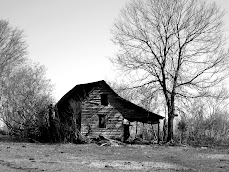
[This column originally appeared in the Friday, December 18, 2009 edition of The Daily Dispatch. We believe that our readers will enjoy what we hope to make an annual tradition.]
Christmas Moon arrived for her annual visit early on the holiday morn. Bowing to the still Earth — cloaked by the cold breath of Winter — the sliver of Christmas Moon cascaded over the frame of a newly built house surrounded by barren fields.
“Merry Christmas,” said Christmas Moon, illuminating this sacred morn with the accompaniment of a host of star-glittering winks.
“Merry Christmas,” answered the infant House, as faint puffs of gray smoke waved greetings from her freshly bricked chimney.
“Tell me, young House,” Christmas Moon said to the structure modeling a coat of fresh white paint, “what do you see from within your sturdy walls anew? What do you see of Christmas this very morn?”
The excitement of the home’s first Christmas beamed from within her timbers. House answered: “I see a father. I see the young man bent before a fireplace, his muscled arms and agile hands kindling a fire to warm his family on this most special of days.”
“Yes. I see this, too,” answered Christmas Moon, smiling on the newborn House. “What else do you see?”
“I see a mother, her nimble fingers sewing the last stitch of a doll’s dress.”
House continued sharing the early morning scene with Christmas Moon — shoeboxes filled with oranges, apples, raisins and nuts! All goodies the father purchased on the eve of this festive day.
Merriment-filled, House turned to her new friend.
“Tell me, Christmas Moon,” said the infant House. “What do you see?”
Wee-hour darkness already fading as sunrise threatened the silent night, Christmas Moon answered, “I see your youth. As I have seen others in their youth.”
Confused, House replied, “I do not understand.”
And as Sun broke forth, Christmas Moon whispered, “But one day you will.”
Christmas Moon disappeared, and House soon felt the quick steps of excited bare feet as they met her chilled floors.
As the seasons passed, House and Christmas Moon reunited early every Christmas morning. And each year, their communion began the same.
“Merry Christmas,” said Christmas Moon, her greeting illuminating a few faded shingles.
“Merry Christmas,” answered the maturing House to her annual visitor.
“Tell me, House,” began Christmas Moon, “what do you see from within your sturdy walls? What do you see of Christmas this very morning?”
House answered, “I see a father. His steady hands are building a fire for his visiting children this Christmas morn.”
“Yes. I see this, too,” answered Christmas Moon to her friend. “Tell me, growing House, what else do you see?”
Saddened, House answered, “I see a mother. I see her praying for her son, who is away battling a war in foreign lands. And I see the silent worry on her husband’s face, as he continues to build the fire. “
After a moment of silence, House looked to Christmas Moon.
“Tell me, Christmas Moon,” House began. “What do you see?” “I see that you have grown older. Still, I see there are things you have yet to learn.”
Confused, House replied, “I do not understand.”
And as the sun invaded their privacy as he did each holiday, Christmas Moon whispered, “But one day you will.”
As the ancient moon disappeared, House felt the quick steps of mother and father, preparing breakfast for their now grown children; those who were present, at least.
The Christmas communions of Moon and House continued as each year passed.
“Merry Christmas,” said Christmas Moon, illuminating the sacred morn over a weathered House clearly showing her age.
“Merry Christmas,” answered House, as faint puffs of grey smoke waved greetings from her chimney, now missing a few bricks.
“Tell me, seasoned House,” said Christmas Moon. “What do you witness from within your great walls? What do you see of Christmas this very morning?”
Excited by this Christmas, House answered, “I see a grandfather. I see the old man, silver-haired and with soft arms building the fire for his children and his grandchildren.”
“Yes. I see, too,” answered Christmas Moon. “What else do you see?”
“I see a grandmother. She’s hanging the final ornaments on a Christmas tree. And she’s wrapping boxes, filled with oranges, apples, raisins and nuts. All goodies the grandfather purchased on the eve of this great day.”
Satisfied with this most festive of morns, House turned to Christmas Moon.
“Tell me, Christmas Moon,” said House. “What is it that you see?”
Darkness quickly fading as sunrise, as always, threatened her peace.
Christmas Moon answered, “I see you have grown older, as I have seen others grow older. And yet, I see you have more to learn.”
Confused, House creaked, “I do not understand.”
And as the sun broke forth, Christmas Moon whispered, “But one day you will.”
As Christmas Moon disappeared, the old House felt the quick step of excited bare feet as they met her chilled floors.
Several years later, Christmas Moon arrived for her annual communion with House, accompanied by glimmering stars who’d long shifted since their first meeting.
But no smoke waved greetings to Christmas Moon. House, her foundation slumped, paint chipped and windowpanes cracked, sat quiet among the barren fields.
“House?” called Christmas Moon.
But House did not answer.
“House,” Christmas Moon called out again. “Tell me, what you have seen? Tell me what you have witnessed within your old walls.”
And with that, House began to cry.
“I have heard the excited shouts of children, whose bare feet met my chilled floors each Christmas morn. I’ve watched these children grow to become parents themselves, and I’ve felt their children’s bare feet on my chilled floors. I’ve seen boxes of oranges, apples, raisins and nuts – handmade presents and homemade feasts. I’ve seen great trees, adorned with lights and ornaments. And I’ve seen them all come, and I’ve seen them all go. I’ve seen a mother and father turn into a grandmother and grandfather. And I’ve seen them go away, too.”
Through tears, House cried, “Tell me, Christmas Moon, tell me what else is there for me to see?”
Christmas Moon bent before House, illuminating her torn-shingled-roof, and began:
“On this very night, many years ago, I saw a young man, in search of a place to rest his wife, who was soon to deliver their first son. I watched as this infant, the Son of God, lay in a manger of hay, worshiped by kings, His promise of peace heralded by Heaven’s angels. I watched as the infant Son of God grew into a man, a healer, deliverer from evil — our Savior. And I’ve cried, as you are now, to see this Savior suffer crucifixion at the hand of man.”
The old House listened.
“I have seen loss, just as have you, ancient House. Yet I have seen the resurrection. I have seen love — the greatest love that grants us reason to celebrate life, despite such sadness.”
At that moment, House comprehended the meaning of this great life – she finally understood Christmas Moon.
And as the darkness faded into sunrise, the fallen House, never before silent on the inside, heard the heavens singing for the first time that Christmas morning. It was the most magnificent of any sound she’d ever heard. Despite the life and beauty that had lived for generations within her once-strong walls, none could match the splendor of this chorus. And suddenly, the house no longer felt old, no longer worn and collapsing. And as House said farewell to Christmas Moon, she joined the angels in singing:
Christ is the Lord;
Let ever, ever praise we;
Noel, Noel;
O night, o night divine;
Noel, Noel;
O night, o night divine.
Read more: The Daily Dispatch - Christmas gift shines from the light on a ‘silent night’

.JPG)









.jpg)


